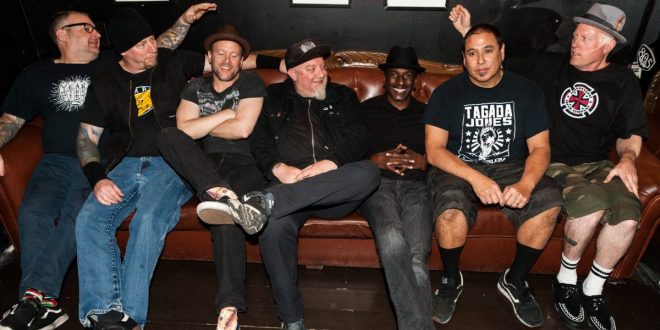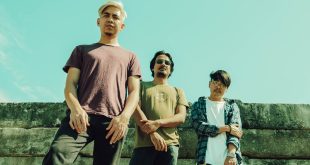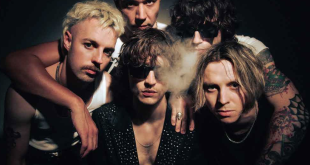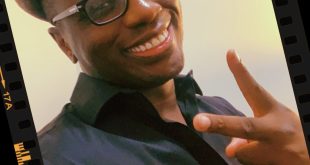California’s Buck-O-Nine is still going strong amidst a nearly three-decade run. The San Diego septet initially honed their chops in the city’s all-ages club scene, and would soon serve as catalysts of the mid-to-late-90s American ska punk movement. By enduring the scene’s decline and a prolonged hiatus, the band’s popularity lives on through their tireless work ethic as well as a growing international fan base. To this day, six of the seven original members are in the band – a true testament to their longevity. Their 6th album and latest with this lineup, FunDayMental, was released last Friday.
I had the pleasure of talking to Buck-O-Nine frontman Jon Pebsworth to discuss their current tour, formative days, the new album, and their placement in the upcoming documentary, Pick it Up – Ska in the 90s, which will be released this Friday.
ME: What kinds of things do you have planned for your tour?
Jon: In May, we’re doing a kind of album release party — we’re calling it the “San Diego music extravaganza” (laughs). That’s on the 11th at a venue called the Music Box. It’s a pretty decent size venue and it’s really nice. It’s fairly new — only like a couple of years old. We’re stoked to play there. A few weeks later, we’re going to Japan for three shows. This’ll be our fourth tour of Japan. When I say “tour,” I mean maybe three to six shows, since it’s so small (laughs), but it’s really cool!
ME: With international exposure, does it blow you away?
Jon: Yeah, it blows me away all the time. I think back to when I was a kid, starting bands. My first band played backyard parties, and I remember when we got to the point where we can play outside of our little town. That might’ve been only 15 or 20 minutes away from where we grew up, but that to us was like, “Dude! Woah! Crazy!” To go from that to playing in Japan, or London, was like a whole other thing that just blows your mind. I get the feeling of going back to myself as a kid, and saying, “Dude, someday you’re going to be playing in Tokyo, or Sydney, Australia!” I wouldn’t have been able to process that (laughs)!
ME: Back when you were growing up, did you start out with ska music, or something else, and then go from there?
Jon: Back then, my parents listened to a lot of good rock music either around the house or in the car. They weren’t musicians or anything, but they had great taste. By the time I was in sixth grade, the first type of music that I really loved was two-tone bands like the Specials and Madness and stuff. It was two-tone bands and mod bands like The Jam and the Clash. Eventually, that led to more punk rock, but ska was always number one.
ME: Buck-O-Nine came out in late 1991 when alternative music began peaking. Was there a familial aspect of the scene you were in?
Jon: In some cases, it felt like a family dynamic with some other bands of the scene. At the same time, though, we had a bit of a struggle in the early days since what we were doing wasn’t fitting in with the traditional ska bands. We had more of that two-tone sound. We were kind of a little too punk rock for the ska crowds. Then, for some of the punk bands at the time, who were doing the NOFX and Bad Religion thing, we were a pure ska band to them. We didn’t really fit in with them either, so we couldn’t really find a foothold. It started helping a lot, though, when more bands like us started popping up. Of course, there were bands doing that before us, like Mighty Mighty Bosstones, and Skankin’ Pickle, but there wasn’t a lot of them.
ME: It’s interesting you bring up the Bosstones. I watched your commentary in the trailer for the new ska documentary, and you mention about the time the band was first picked up by radio. You were saying “Has radio become awesome, or have the Bosstones become so awesome that they can’t say no anymore?” That made a lot of sense, given how cool it was to hear underground music on otherwise mainstream stations. Did you guys welcome those opportunities as well?
Jon: I think so. Before that, there was a feeling that the radio just plays top 40 bullshit. Some of it’s okay, but most of it’s cheesy and not gritty enough for people like us, who like some nice edge to our music. But then when they started to play Bosstones and even Green Day, I thought, “Hey, if radio’s gonna play this kind of stuff, maybe it’s not all bad. Maybe it’s finally waking up to being able to play stuff that I like.“ It was great to be able to just get in your car and not worry about having a tape or CD to play; you just turn on the radio and there’s your music.
ME: It was a really tricky time, because you essentially had a bunch of these obscure indie acts struggling the year before, and then all of a sudden, they have a major label and a media storm. There was a real cynicism about that aspect, right?
Jon: Definitely, man. There always will be that — the feeling of someone thinking you ‘sold out’ just because you were on the radio. To me, deciding to sell out was like this: Are you writing songs for yourself, what you want to hear, and your own artistic vision, or are you writing songs that you think the general audience wants to hear? To answer that question, we write songs for ourselves — they’re cathartic, the type of music we like to play, and are what we want to hear. But we’ve never felt guilty about doing other things that would be considered selling out, like getting on the radio. We just do what we do. If the radio wants to play our songs, well, shit, let them (laughs)!
ME: You have your new album, FunDayMental, out now. Are you excited?
Jon: Yeah, I’m over the moon about it! I love it so much. We worked incredibly hard on this record and it’s something that we’ve been talking about for years. We finally just kind of dug into our roots and started really working on it. It took us about two years, but we’re super proud of it; couldn’t be happier.
ME: Yeah. As I was backtracking through Buck-O-Nine’s material, I notice that the sound you have now alluded back to those early days.
Jon: Yeah! We feel like we’ve always had a core thing that we’ve done, mixing ska, reggae, and punk. Sometimes there are songs that are all punk, sometimes all ska, and sometimes all reggae. There’s even sometimes a mixture of the three within one song. Basically, all of what you hear on FunDayMental is the same that it’s always been — the same songwriters that have been doing this since ‘91.
ME: How was production handled to give the album its sound?
Jon: Believe it or not, we actually did this one all ourselves, so this was a new thing for us. Our trumpet player, Tony Curry, took the helm of being the producer and engineer.
ME: Was it difficult in the beginning, or did it all come together pretty quickly?
Jon: We felt pretty confident about it, and the sound quality he was getting out of his studio was the best out of everything I’ve heard. He’s super, super talented, has a great ear for music, and is one of the songwriters in the band, so we figured we couldn’t lose, really. We have the ability and the facilities to do it all ourselves.
ME: With your new single, “Tuff Rudeboy,” it’s almost like a celebration of your ska roots.
Jon: Yeah! That song is also about so many other different things, it would take me all day to list them. But the gist of it, for the most part, is about life happening as you get older, going down different paths and trying new things. Some of that song talks about the work that I had to do in the past five or six years where I was like, “Fuck this place! I don’t wanna work here anymore! This ‘working stiff’ shit is lame!” which is what I used to sing about in the early days (laughs).
ME: Bringing it all together, with the other single out now, “Top of the World,” about taking a step back, do you find yourself doing that nowadays?
Jon: In essence, that’s what the song’s about. Taking a step back before you get too serious about life, and just being like, “Okay, let’s make sure we’re looking at this from every possible perspective and then choose the most positive way to deal with life.” It’s about finding your own ‘top of the world’ and then living with a cool, positive outlook.
ME: To this day, you have six of the seven original members with you. That’s pretty impressive!
Jon: Yeah. It’s everyone in the band except for our bass player. He’s been with us since the Sustain record, which was back in 2007. All the other guys were on our first three records, and then Steve Bauer, our drummer, took a break, but then came back for FunDayMental. Technically, me, the guitar player, and the three horn players have stayed ever since day one.
ME: For the ska punk documentary, will there eventually be a wide video release?
Jon: That’s a good question. They tell me it will eventually be on Netflix and Amazon. I don’t know all the details of their business, but for now, they’re doing the theatrical release. These guys are super smart, and they know what they’re doing, so it will eventually be somewhere for everyone to see.
ME: Yeah, I’ve known a lot about different docs on different scenes. There’s Monterey Pop, which is about the 60s, there’s Hype!, about northwest grunge, and then this one about ska punk, so that would be awesome!
Jon: Yeah! It’s funny because when they were interviewing me, they were asking me a bunch of questions — a lot of good ones, too — but I would start to veer off and talk about ska from the 60s and 70s. They’d be like, “Okay, well, we’re not too interested in that” (laughs). At first, I thought it was a documentary on the general history of ska, and they just wanted to focus on the 90s. I was like, “Ah, okay (laughs).”
ME: What you’re referring to more so is the early, early stuff, recorded in dingy studios.
Jon: Yeah, I love that old rocksteady stuff — Toots and the Maytals, Desmond Dekker — fantastic music!
ME: Lastly, anything you’d like to say to your fans?
Jon: I’d like to say thanks to everyone who has given us support over the years — whether it’s coming to shows, hitting us up on social media, or like they used to do back in the day, handwritten letters. It’s so awesome especially when someone comes up to you after a show to thank you personally for the music. Typically, they’ll have like a cool story about how they first heard the band, or how the band affected their lives. I come home from road trips and love telling my wife all these stories, like, “There was this one guy telling me how our music helped him through high school!” It’s fuel, and it’s really great. It’s crazy that our lyrics affected them like that because I remember writing them in my boxers at three o’clock in the morning, drinking beers and chain-smoking cigarettes (laughs). It came from deep within me, of course, but to affect them in such a way, it’s pretty rad!
Buck-O-Nine Socials:
 Music Existence Because of Music, We Exist
Music Existence Because of Music, We Exist



